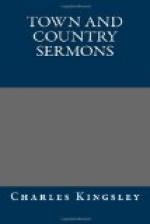Besides, as a fact, the earth does not bring forth thorns and thistles to us, but good grain, and fruitful crops, and an abundant return for our labour, if we choose to till the ground.
And wise men, who study God’s works, can find no curse at all upon the earth, nor sign of a curse, neither in plants nor beasts, no, nor in the smallest gnat in the air. The more they look into the wonders of God’s world, the more they find it true that there is order everywhere, beauty everywhere, fruitfulness everywhere, usefulness everywhere—that all things continue as at the beginning; that, as the psalmist says in another place, God has made them fast for ever and ever, and given them a law which cannot be broken. And if you will look at Genesis viii. 21, 22, you will find from the plain words of Scripture itself, that Adam’s curse, whatever it was, was taken off after the flood, ’And the Lord smelled a sweet savour: and the Lord said in his heart, I will not again curse the ground any more for man’s sake; for the imagination of man’s heart is evil from his youth; neither will I again smite any more everything living, as I have done. While the earth remaineth, seed-time and harvest, and cold and heat, and summer and winter, and day and night shall not cease.’
Therefore, my friends, open your eyes and your hearts freely to the message which God is sending you, in summer and winter, in seed-time and in harvest, in sunshine and in storm; that God is not a hard God, a revengeful God, a God of curses, who is extreme to mark what is done amiss, and keepeth his anger for ever. No: but that he is your Father in heaven, who hateth nothing that he has made, and whose mercy is over all his works; who made heaven and earth, the sea, and all that therein is; who keepeth truth for ever; who helpeth them to right that suffer wrong; who feedeth the hungry; a God who feeds the birds of the air, though they sow not, neither do they reap, nor gather into barns; and who clothes the grass of the field, which toils not, neither doth it spin; and who will much much more clothe and feed you, to whom he has given reason, understanding, and the power of learning his laws, the rules by which this world of his is made and works, and of turning them to your own profit in rational and honest labour.
And think, my friends, if the old Psalmist, before Christ came, could believe all this, and find comfort in it, much more ought we. Shame to us if we do not. I had almost said, we deny Christ, if we do not. For who said those last words concerning the birds of the air, and the grass of the field? Who told us that we have not merely a Master or a Judge in heaven, but a Father in heaven? Who but that very Word of God, whom the Psalmist saw dimly and afar off? He knew that the Word of God abode for ever in heaven: but he knew not, as far as we can tell, that that same Word would condescend to be made flesh, and dwell among men that we might




